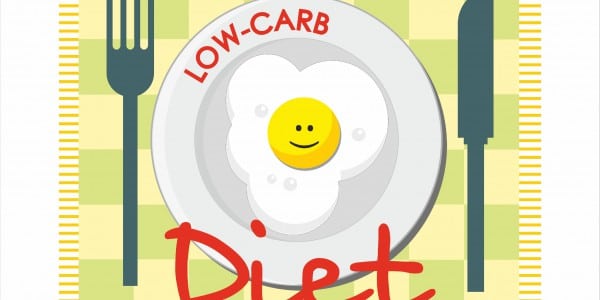I’m sure you’ve encountered a doctor who at some point advised you to “eat less and exercise more.” We ladies with Hashimoto’s or hypothyroidism hear it all the time, right? With that said, and because it can be a challenge to lose weight, it can be difficult to avoid being on a diet. The problem is that diets don’t work long term. Also, research shows that restricting types of diets, especially those that restrict carbohydrates actually impair thyroid function. Unfortunately, this information is not usually discussed publicly by the multi million dollar dieting business world. I know what you’re thinking….“wow, this is just great…now what do I do?”
Low carb diets are frequently recommended by practitioners for the treatment of reactive hypoglycemia, elevated triglycerides and obesity, and low carb eating is also a popular mainstream choice for those who want to lose weight. Researcher’s Ullrich et al (American College of Nutrition, 1985) found that low carb diets may affect thyroid function. Their study looked at the effects of replacing carbs with either protein or fat in seven healthy young adults (one diet replaced carbs with polyunsaturated fat, and the second replaced carbs with protein). The diet replacing carbs with fat was high in polyunsaturated fat with 10%, 55%, and 35% of total calories derived from protein, fat, and carbohydrate, respectively. The second diet was high in protein with 35%, 30%, and 35% of total calories derived from protein, fat, and carbohydrate. On the 8th day fasting blood samples were obtained from all participants of each diet.
Triiodothyronine (T3) declined the most following the diet high in polyunsaturated fat than in the high protein diet. Thyroxine (T4) and Reverse T3 (rT3) did not change significantly. Even though a meal high in polyunsaturated fats decreased thyroid function, thyroid-stimulating hormone (TSH) declined equally after both diets; and, the insulin level was much higher 30 minutes after the high protein meal than the high fat meal. The researcher’s found the only obvious benefit of replacing carbohydrate with polyunsaturated fat rather than protein was less of an insulin response and less post peak decreases in blood glucose and lower triglycerides. It is not known what the significance of the lower T3 level was attributed to (SOURCE).
Research scientists Volek, et al (Metabolism, 2002) looked at body composition following a diet that restricted carbohydrates and found enhanced fat loss with preservation of lean muscle mass in obese study participants. In this group, there was an increase in total thyroxine (T4); however, no significant changes in triiodothyrone (T3) uptake (SOURCE).
Overall, it was found that low carb diets lower T4 levels and increase the levels of Reverse T3 although TSH remained normal. Incorporating healthy fats for optimal thyroid function might include a plan that closely replicates fat composition of breast milk: 47.5% saturated, 40.5% monounsaturated, and with only 12% polyunsaturated rather than the 55% polyunsaturated fat found in the eating plans of the Ullrich study.
IMPORTANT: Aside from consuming healthy fats, the bottom line is that in order to convert inactive T4 into the active form of thyroid hormone (T3) to be utilized by the body requires insulin…and insulin is typically very low in follower’s of low carb diets. Despite a healthy liver or GI tract, the hormone known as insulin must be present for the conversion. Protein can increase insulin, but how high your insulin goes depends on the type of protein and whether or not you have diabetes.
This is not a message to go out and load up on carbs, e.g. grains, grain-based products or sugars…not at all. What you want is a healthy balance of low-glycemic fruits & vegetables, grain-like seeds, and fermented vegetables in addition to healthy fats (monounsaturated & saturated) and lean proteins, e.g. grass fed beef, organic, pastured chicken, and wild caught fish (I love wild Alaskan & Coho salmon). I shared these earlier in the course, but as a reminder be sure to check out my favorite healthy fat salad dressings HERE and HERE.
Restricting carbs will result in weight loss in the short term…but often at the risk of triggering underactive thyroid, the rebound effect (weight gain), fatigue, and hair loss. This can be difficult if not impossible to overcome, as you may already know. The short term benefit is definitely not worth the potential long term risk to your thyroid health.
Resource:
Hedberg, N. Thyroid Disorders 2015 Research Update & Clinical Pearls [PDF document].
Lemon and Thyme Broiled Salmon with Blood Orange Salsa
Autoimmune/Thyroid Friendly
Ingredients:
2 lbs. blood oranges, segmented
Juice and zest of 1 lime
1/2 red onion, diced
3 stalks celery, diced
1/4 cup chopped fresh cilantro
1/4 cup fresh lemon juice
1 Tbsp. lemon zest
1 Tbsp. fresh thyme, chopped
1/2 cup orange or apple juice, unsweetened
four each 6 to 8 oz. wild-caught salmon fillets
Directions:
Combine blood orange segments, juice & zest of lime, red onion, celery, & cilantro in a bowl and refrigerate until time to serve. Combine lemon juice & zest, thyme, and orang or apple juice. Pour over salmon fillets in a resealable bag or container and marinate 15 minutes. Adjust oven rack so that salmon will be 6-8 inches from the top element. Preheat broiler 10 minutes. Line a baking sheet with foil or parchment paper. Remove salmon from marinade and place on baking sheet. If salmon fillets have skin, lay them skin side down. Discard remaining marinade. Broil 9-12 minutes until opaque throughout and segments flake apart easily. Serve with salsa and a side salad or asparagus. Enjoy!


